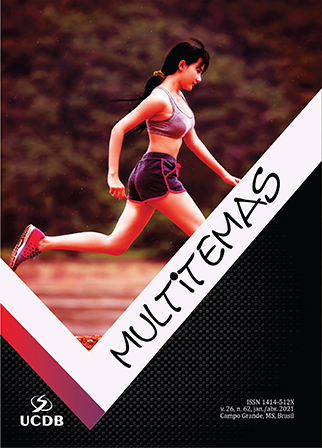Pierre Hadot e Marco Aurélio: da leitura à atualização
DOI:
https://doi.org/10.20435/multi.v26i62.2625Palavras-chave:
diário de campo, subjetividade, Filosofia como modo de vidaResumo
O texto que segue é uma exploração dos escritos de Pierre Hadot sobre Marco Aurélio, sobretudo os Diários, objetivando delinear os temas mais salientes acerca de vivências complexas para os seres humanos, mostrando como os dois autores as relacionam. O trabalho persegue a metodologia do ensaio documental. A experiência de diário de campo surge como uma perspectiva para apresentar a percepção do cotidiano e seus pequenos desafios como o berço das perguntas filosóficas. Na tessitura do texto, aparece Marco Aurélio como personagem que atravessa o pessimismo e o otimismo com os hinos à beleza da natureza, mediando as suas reflexões com intuições e princípios estoicos. Apresentamos, assim, a reflexão como uma modalidade da liberdade daquele que já alcançou a indiferença, entendida na perspectiva estoica como a superação das altercações históricas com a indeterminação, para além das mutações situacionais que não esperava viver. De fato, o filósofo autônomo vive as mutações e se realiza sem deixar-se apreender pela prisão da vontade, mas experimenta e comunica a simetria entre as experiências que se oferecem e sucedem, qualificando a vida humana do início ao fim. Esta proposta coloca-se diante da possibilidade de abraçar a transitoriedade, cultivando o bem viver e o cuidado de si, num mundo que parece esquecido do valor da pessoa humana.
Referências
ARISTÓTELES. Metafísica – Ética a Nicômaco – Poética. São Paulo: Abril Cultural, 1979. V. 2. (Coleção Os Pensadores).
ARRIANO, F. O Encheirídion de Epicteto. São Cristóvão: Universidade Federal de Sergipe, 2012.
DILTHEY, W. O Surgimento da Hermenêutica (1900). Númen, Juiz de Fora, Vol. 2, no. 1, p. 11-32. 1999.
DODDS, E. R. Pagani e cristiani in un’epoca di angoscia. Firenze: La Nuova Italia, 1993.
EVENS, T.; HANDELMAN, D.; ROBERTS, C. Reflecting on reflexivity: the human condition as an ontological surprise. New York: Berghahn Books, 2016.
FRANCISCO, P. Misericordiae vultus. São Paulo: Edições Loyola, 2015.
FRASCHETTI, A. Marco Aurelio: la miseria della filosofia. Bari: Editori Laterza, 2015.
GRIMAL, P. Marco Aurélio: o imperador filósofo. Rio de Janeiro: Zahar, 2018.
HADOT, P. A Filosofia como maneira de viver. São Paulo: É Realizações, 2016.
HADOT, P. Exercícios espirituais e Filosofia antiga. São Paulo: É Realizações, 2014a.
HADOT, P. O que é a Filosofia antiga? São Paulo: Edições Loyola, 2014c.
HADOT, P. Wittgenstein e os limites da linguagem. São Paulo: É Realizações, 2014b.
LOYOLA, I. Exercícios espirituais. São Paulo: Edições Loyola, 1990.
MACIEL, J. C. A ciência psicológica em primeira pessoa: o sentido do método heurístico de Clark Moustakas para a pesquisa em psicologia. 2004. Tese (Doutorado em Psicologia) − Pontifícia Universidade de Campinas: Campinas, SP, 2004.
MARCO AURÉLIO. Meditações. Tradução de Luís A. P. Varela Pinto. Espinho: Penguin Books, 2002.
PLATÃO. República. 9. ed. Lisboa: Fundação Calouste Gulbbenkian, 2001.
RIBEIRO, D. Diários índios: os Urubu-Kaapor. São Paulo: Companhia das Letras, 1996.
TEIXEIRA, C. A.; BRANDÃO, J. L.; RODRIGUES, N. S. História Augusta I. Coimbra: CECH, 2011.
Downloads
Publicado
Como Citar
Edição
Seção
Licença
Os artigos publicados na Revista Multitemas têm acesso aberto (Open Access) sob a licença Creative Commons Attribution, que permite uso, distribuição e reprodução em qualquer meio, sem restrições desde que o trabalho original seja corretamente citado.
Direitos Autorais para artigos publicados nesta revista são do autor, com direitos de primeira publicação para a revista. Em virtude de aparecerem nesta revista de acesso público, os artigos são de uso gratuito, com atribuições próprias, em aplicações educacionais e não-comerciais.





